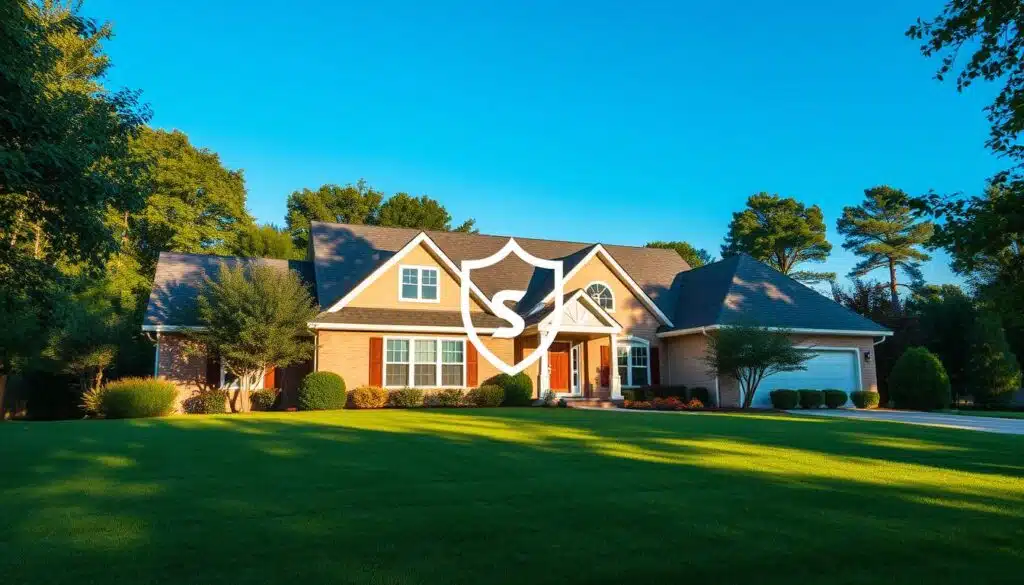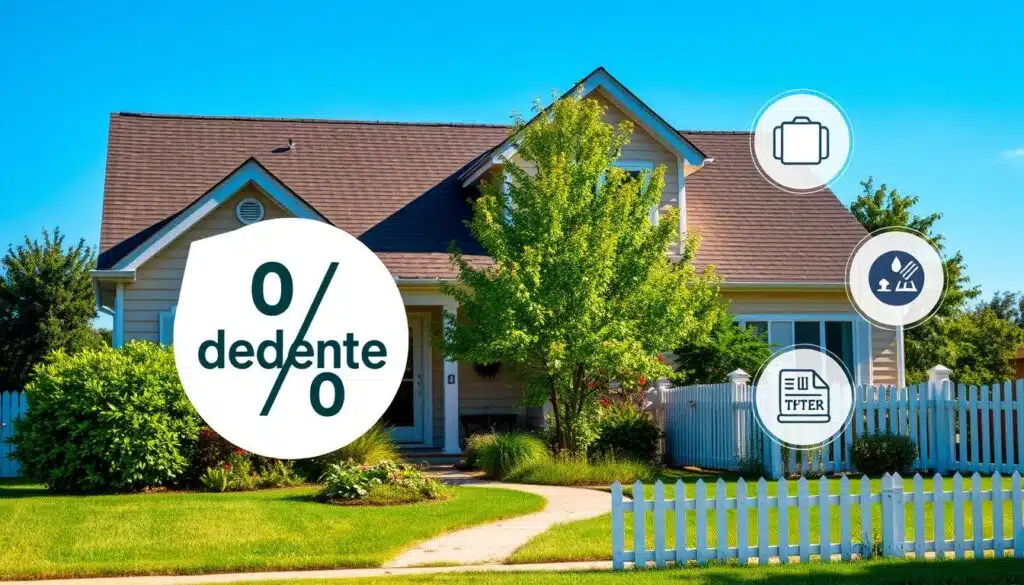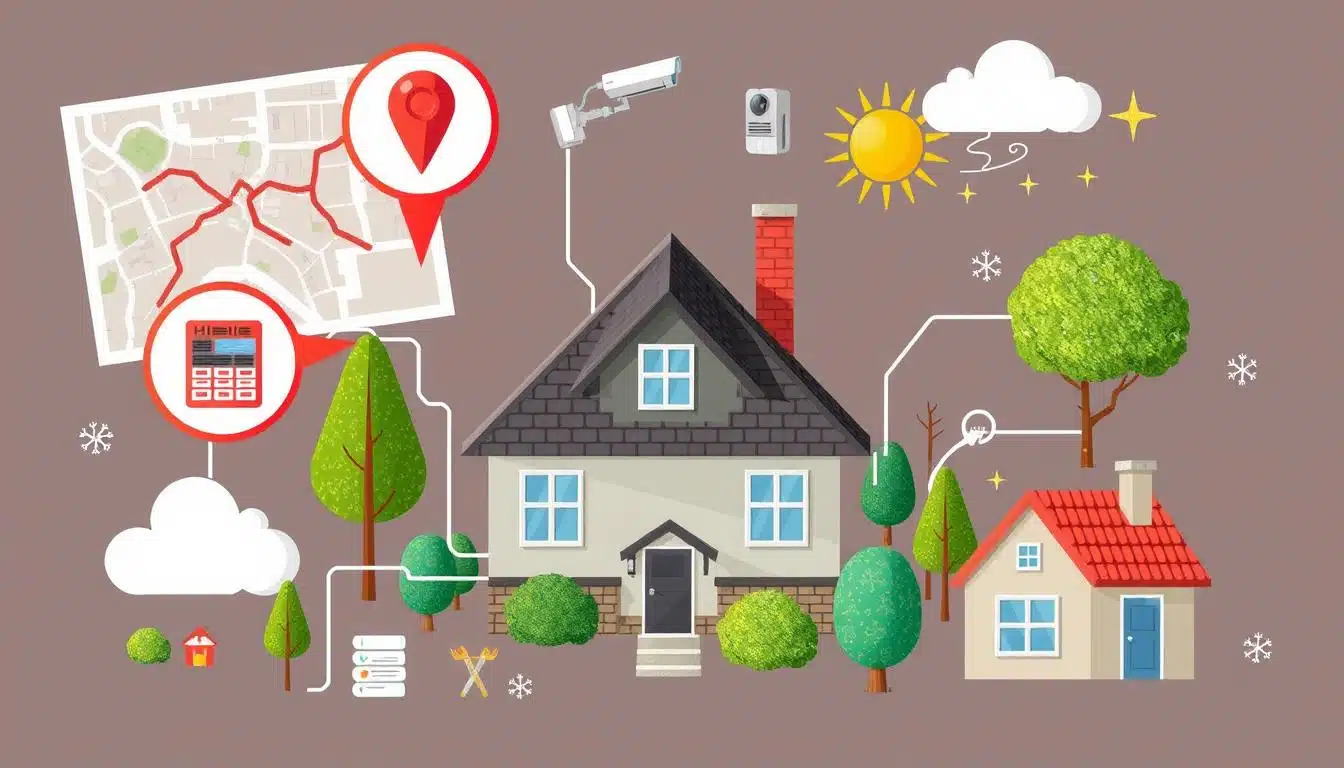Insurance Quotes House Many American homeowners want affordable homeowners insurance. The average cost is $2,151 per year. But, rates can change a lot based on personal and property factors.
Insurance companies look at risk levels to set premiums. They consider location, dwelling coverage, credit history, claims history, marital status, and home age. These are the main things that affect your insurance quote.
Knowing these factors can help homeowners understand their insurance quotes better. It can also help them find ways to lower their premiums. By understanding what affects insurance rates, homeowners can make better choices about their coverage.
Key Takeaways
- The average cost of home insurance in the United States is $2,151 per year, but rates can vary significantly based on location, property characteristics, and personal factors.
- Insurance companies assess risk when determining premiums, with location, dwelling coverage, credit history, claims history, marital status, and home age being the key influencing factors.
- Homeowners who understand these critical factors can better comprehend their insurance quotes and potentially identify ways to lower their premiums.
- By gaining insights into the driving forces behind insurance rates, homeowners can make informed decisions about their coverage options and find the most suitable policy to protect their investment.
- Factors like natural disaster risk, proximity to emergency services, and local construction costs can significantly impact insurance rates in different geographic areas.
Location and Geographic Risk Factors
Location is key when it comes to home insurance. Places prone to natural disasters like tornadoes, hurricanes, or wildfires have higher rates. For example, homes in Tornado Alley might pay up to 50% more than the national average. On the other hand, Hawaii usually has the lowest insurance costs.
Being close to emergency services like fire stations can lower your insurance. This is because insurers know they can respond faster in emergencies. Local construction costs and crime rates also play a role in insurance rates.
Natural Disaster Prone Areas
Some areas face more natural disasters, leading to higher insurance costs. Flood insurance and hazard insurance are often needed in these places. Insurers adjust rates based on these risks, sometimes causing problems for homeowners.
In Florida, for example, increased disaster risks have led to policy non-renewals. This has caused some major insurers to leave the market.
Proximity to Emergency Services
How close your home is to emergency services affects your insurance rates. Homes in big cities, with higher real estate values and construction costs, often have higher premiums. But areas with lower growth, less crime, and fewer storms usually have lower rates.
Local Construction Costs
The cost to rebuild or repair a home is a big factor in insurance rates. Areas with high construction costs, like big cities, tend to have more expensive insurance. The price of labor, materials, and living costs in the area all affect your insurance quote.
Property Characteristics and Insurance Quotes House

Home insurance costs depend on your property’s features. The home value, age of your home, and structure of your home are key. Insurers use these to figure out your insurance quotes.
The dwelling coverage is based on how much it would cost to rebuild your home. Older homes might cost more because of outdated materials and code issues. On the other hand, recent home renovations can change your rates, either up or down.
Features like swimming pools or trampolines might need more liability coverage. This can raise your premium. Insurers look at your home’s structure and risks to offer standard home insurance that fits your needs.
| Property Characteristic | Impact on Insurance Quotes |
|---|---|
| Home Value | Higher home value = Higher dwelling coverage and potentially higher premiums |
| Age of Home | Older homes = Higher risk of issues and potentially higher premiums |
| Home Renovations | Depends on the type of improvement: Can increase or decrease premiums |
| Swimming Pools/Trampolines | Require higher liability coverage, leading to increased premiums |
Knowing how your property’s features affect insurance quotes helps you make smart choices. It’s about rebuilding your home, keeping it in good shape, and getting the right home insurance to protect it.
Personal Factors Impacting Premium Costs

Personal factors greatly affect home insurance costs. Insurance companies look at many things to decide how much to charge. These include credit history, claims history, marital status, and demographics.
Credit History and Insurance Scores
Credit scores are key in most states for insurance. People with higher scores pay less for insurance. This is because insurers think they are less likely to make claims.
Claims History and Previous Insurance Records
Claims history affects rates for up to seven years. If you’ve filed many claims, you might pay more. This is because insurers see you as a higher risk.
Marital Status and Demographics
Being married can lower your insurance costs in most states. Married couples often get better rates than singles or the divorced. Age also plays a role in what insurers charge.
To lower your costs, look for insurance discounts and savings. Discounts are available for bundling policies, paying yearly, or using automatic billing. By comparing home insurance and using insurance discounts and savings, you can manage your insurance scores and keep costs down.
| Factor | Impact on Premiums |
|---|---|
| Credit History and Insurance Scores | Higher scores associated with lower premiums |
| Claims History and Previous Insurance Records | Multiple claims can lead to higher rates for up to 7 years |
| Marital Status | Married couples often receive lower rates than single or divorced individuals |
| Demographics (e.g., age) | May be considered by insurers when determining premiums |
“Insurers assign insureds to rating ‘tiers’ with others who have similar characteristics, with some using ‘multi-tier’ rating programs.”
Coverage Options and Deductible Choices

Choosing the right homeowners insurance coverage and deductible is key. It affects your premium costs a lot. Knowing these factors helps you find the best balance between protection and cost.
The standard homeowners insurance policy, known as an HO-3 policy, covers many things. This includes your home, personal items, liability, and medical payments. You can also add extra coverage for special items or water damage.
The deductible you pick greatly affects your premium. A higher deductible means lower monthly or yearly costs. But, it also means you pay more when you file a claim. For instance, going from a $500 to a $1,000 deductible can cut your premiums by about 6%.
In some areas, you might have different deductibles for things like wind damage from storms. It’s smart to check your policy often. This way, you make sure you have the right protection for your budget.
“Reviewing your homeowners insurance policy and understanding the coverage options and deductible choices is crucial to finding the right balance between protection and cost.”
By thinking about your coverage and deductible, you can customize your policy. This way, you get the protection you need while keeping costs down. This careful planning helps you get the most from your homeowners insurance coverage and insurance policies.
The type of property insurance you pick and the details in your standard homeowners insurance policy matter a lot. They affect your protection and what you have to pay. Taking time to understand these can help you make smart choices. This ensures you have the right coverage.
Also Read : The Role Of Insurance Agents In Protecting Your Assets
Conclusion
Knowing what affects home insurance quotes is key for homeowners. Things like location, property type, and personal details matter a lot. They all help decide how much you’ll pay for insurance.
Insurance costs are going up because of more claims and inflation. Homeowners should check their policies often. They should also look for cheaper options by comparing quotes.
There are ways to lower your insurance costs. Keeping your credit score up and adding home security can help. Bundling policies and choosing the right coverage and deductible can also save you money.
Using discounts for things like claims-free records or safety devices can also cut costs. This way, you get good protection for your home without breaking the bank.
Understanding what affects insurance rates helps homeowners make smart choices. They can protect their biggest asset while staying financially stable. This is especially important in case of unexpected events or disasters.
FAQs
Q: What is homeowners insurance?
A: Homeowners insurance is a type of property insurance that provides financial protection against damage to your home and personal belongings, as well as liability coverage for accidents that occur on your property.
Q: How do I get a homeowners insurance quote?
A: You can get a homeowners insurance quote by contacting an insurance provider directly, filling out an online form, or using an insurance agent to compare homeowners insurance quotes from different companies.
Q: What does homeowners insurance cover?
A: Homeowners insurance typically covers damage to your home caused by events such as fire, theft, vandalism, and certain natural disasters, as well as liability coverage for injuries that occur on your property.
Q: How can I compare homeowners insurance quotes?
A: To compare homeowners insurance quotes, you can gather quotes from multiple insurance companies, either by getting a free quote online or through an insurance agent, and analyze the coverage limits, deductibles, and premiums offered.
Q: Are there homeowners insurance discounts available?
A: Yes, many insurance companies offer homeowners insurance discounts for various reasons, such as bundling home and auto insurance, installing security systems, or having a claims-free history. Be sure to ask your insurance provider about available discounts.
Q: How much home insurance do I need?
A: The amount of home insurance you need depends on the value of your home, the cost to rebuild it, and the value of your personal belongings. It’s important to review your home insurance coverage periodically to ensure it meets your current needs.
Q: Can I get a free home insurance quote online?
A: Yes, many insurance companies provide the option to get a free home insurance quote online, allowing you to quickly compare rates and coverage options from the comfort of your home.
Q: What should I do if I have questions about homeowners insurance?
A: If you have questions about homeowners insurance, you can reach out to your insurance agent, contact your insurance provider, or visit online resources that provide detailed information about homeowners insurance coverage and policies.
Q: Is landlord insurance different from homeowners insurance?
A: Yes, landlord insurance is specifically designed for rental properties and typically includes coverage for loss of rental income and liability protection for landlords, whereas homeowners insurance is meant for owner-occupied residences.
Q: What is the national flood insurance program?
A: The National Flood Insurance Program (NFIP) is a federal program that provides flood insurance to property owners, renters, and businesses in participating communities, offering coverage for damage caused by flooding that is not typically included in standard homeowners insurance policies.





